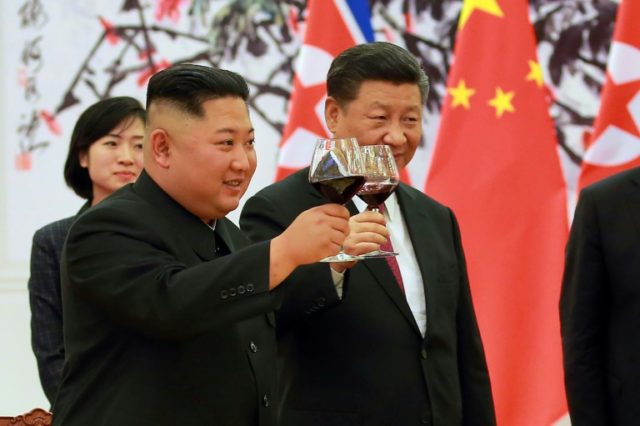China opened a bridge to North Korea on Monday, sending four buses from the North Korean city of Manpo across the Yalu River to the Chinese city of Jian. The bus rides inaugurated a span built three years ago but never crossed until now.
The most benevolent theory for the sudden opening of the bridge is China’s desire to take advantage of legal tourism opportunities in North Korea. The more sinister take is that the bridge crossing signals a renewed Chinese determination to undermine U.S. sanctions against the regime in Pyongyang.
The South China Morning Post reported on Tuesday that about 120 people rode the buses back and forth across the Manpo-Jian bridge, many of them ostensibly tourists. Tourism is not prohibited by the U.N. sanctions China vowed to uphold and represents one of the few legal means for North Korea to earn valuable foreign currency.
Bloomberg News noted the bridge was designed to accommodate cargo vehicles as well, and the checkpoint includes a customs facility. China’s Global Times called it “one of the biggest and most up-to-date customs facilities in Northeast China” and noted the newly-opened bridge could give China improved access to mineral resources in North Korea.
Some South Korean observers think the bridge was opened as a symbolic gesture indicating China is ready for increased trade with North Korea, even though U.N. sanctions restrict most profitable goods that could be moved across the border.
The Global Times quoted a Chinese social scientist describing the bridge as “a manifestation of China’s confidence in a nuclear-free, peaceful, and prosperous Korean Peninsula.” The Manpo-Jian bridge has considerable symbolic significance for North Korea because the previous dictator, Kim Jong-Il, crossed into China from Manpo in 2010 on a rare trip out of the country.
North Korean exports to China are down 87 percent since 2018, while China’s overall trade with North Korea has declined ten percent. North Korean dictator Kim Jong-un has been promising his people an economic renewal that would be nearly impossible to achieve without loosening sanctions and repairing his somewhat strained relationship with China.
China may intend the bridge opening as a signal it expects those sanctions to be loosened soon, possibly at the urging of South Korean President Moon Jae-in when he visits U.S. President Donald Trump in Washington on Thursday.
Moon is reportedly determined to jump-start diplomacy between the U.S. and North Korea following a stall at the summit in Hanoi in February. Aides to President Moon said last week that he will ask Trump to ease sanctions against North Korea to bring it back to the negotiating table, particularly sanctions that prevent North and South Korea from embarking on joint projects.
Legal commerce between North Korea and China has been sharply curtailed by sanctions, but the black market is booming. Radio Free Asia reported on Monday that Chinese smugglers have amassed fortunes by slipping illegal goods across the Yalu River, forming lucrative partnerships that often grow into impromptu corporations.
Sanctions have made items such as auto parts and power generators so valuable that the high cost of bribing officials to look the other way while illegal shipments cross the river is no longer an obstacle. Impoverished North Koreans eager to make a little money on the side are willing accomplices, including government officials and military officers. Bribes are unnecessary for some smuggling activities that have been tacitly endorsed by Beijing and Pyongyang, particularly illicit mineral sales – the very same trade that stands to benefit from the Manpo-Jian bridge.

COMMENTS
Please let us know if you're having issues with commenting.